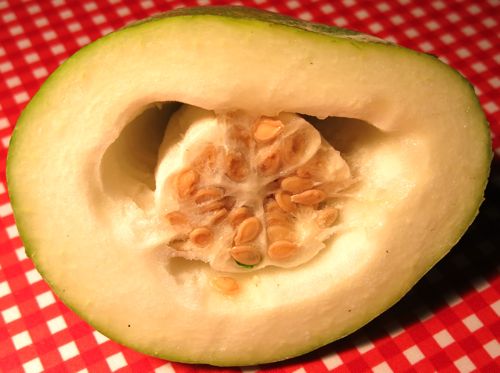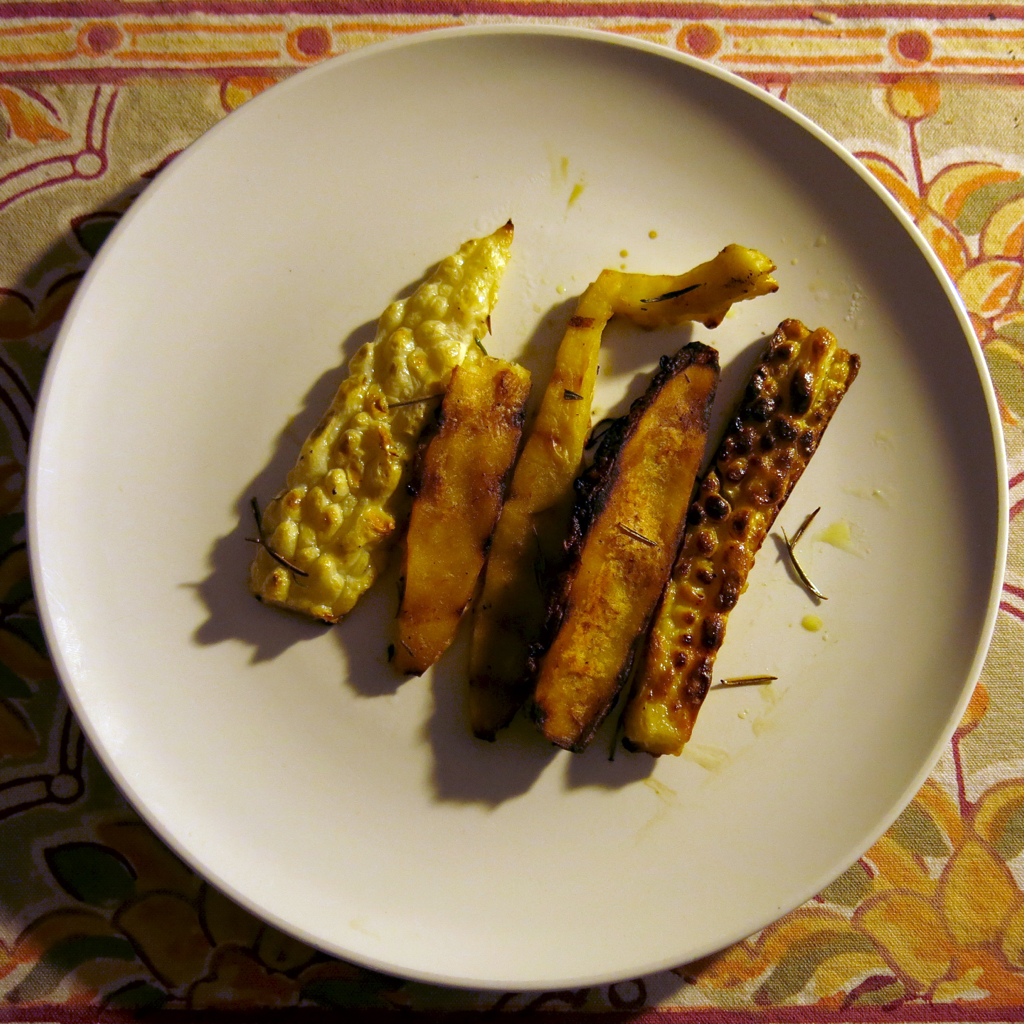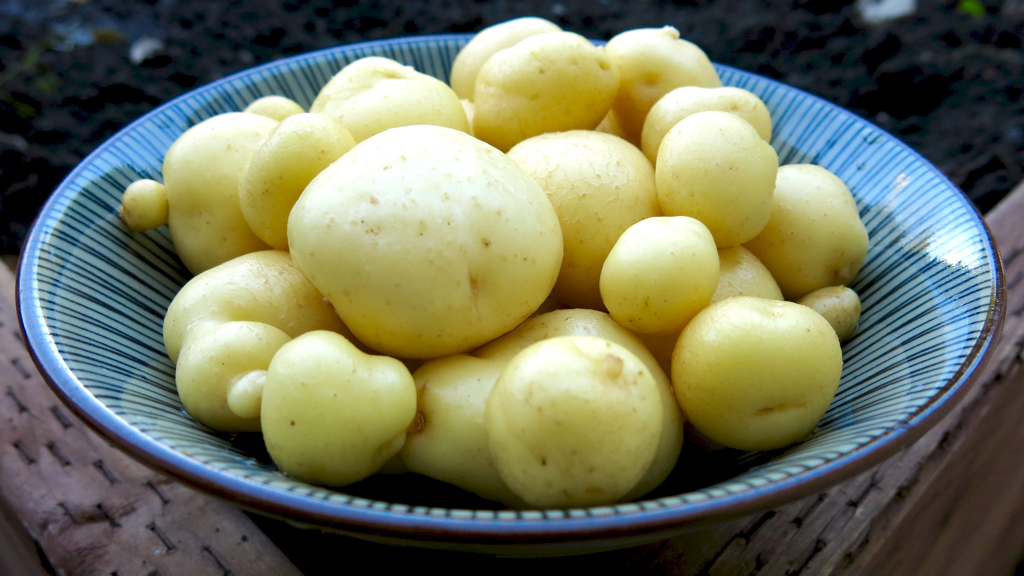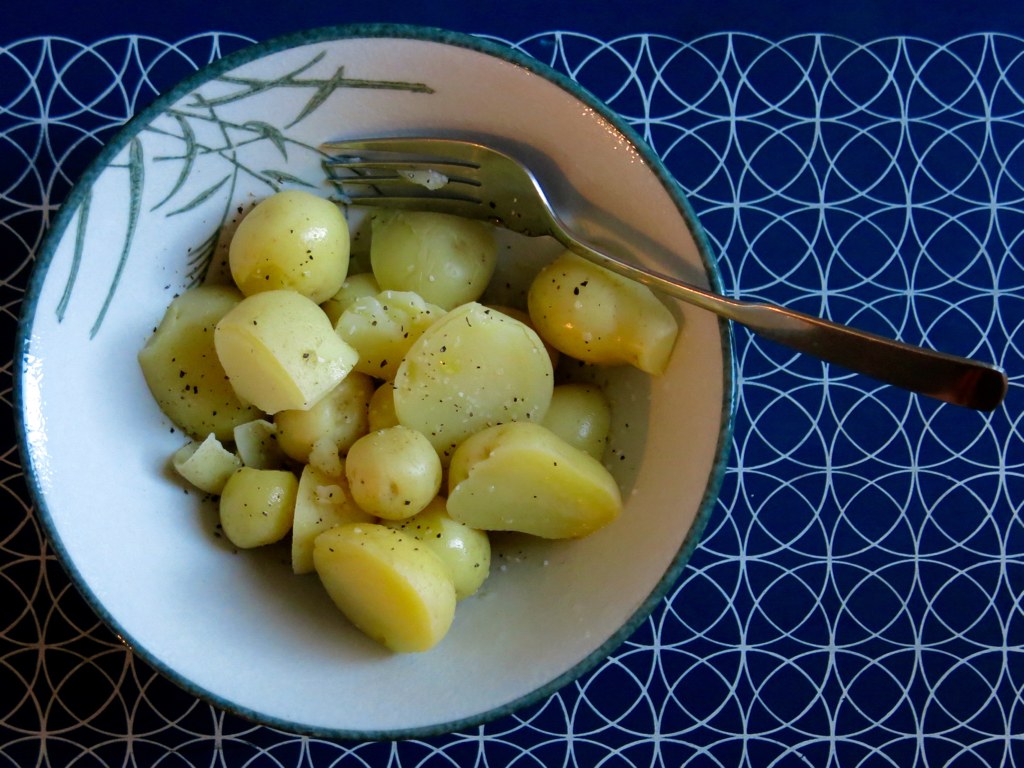It was hot today, so we decided to grill our dinner. I hardly ever eat beef any more (can’t afford it, it’s bad for me), but Carol had gotten some local grass-fed beef from a nearby farm, so we grilled hamburgers and potatoes. That wasn’t quite enough for a dinner. Carol saw that we had a small mild white bitter melon in the refrigerator — what about grilling that? She basted it in olive oil and rosemary before she grilled it. It turned out well — slightly crispy, nicely bitter, very yummy.
Tag: local food
New potatoes
We planted a four foot row of potatoes right after we moved in to our new place, back in November. Something ate most of the leaves from the plants, and they slowly withered and died. This evening, Carol said we should look to see if there were any potatoes. I turned the heavy black soil over with a spading fork, and she sifted through looking for potatoes. We wound up with about a pound and a half of new potatoes. I took them in to the kitchen and carefully scrubbed them, trying to keep as much of the tender skin as I could.
When they were washed, I cut up the larger ones. I put them in a pot of simmering water for a few minutes. We served them with nothing more than some olive oil, a little kosher salt, and a sprinkling of black pepper.
Less than an hour after we pulled them out out of the soil, we were eating them. They tasted wonderful: faintly earthy, with a delicate texture.
Winter melon
What would you do with a half a winter melon? I’ve gotten friendly with a farmstand that specializes in Asian vegetables at the San Mateo Farmer’s Market. The woman who runs the farmstand knows I love bitter melon, and has told me about its health benefits. She probably figured this white guy needed to expand his Asian melon repertoire, so today she gave me half a winter melon, and said, “Try it in soup.”
There are lots of winter melon soup recipes online, and I’m leaning towards a simple one with dried black mushrooms, chicken broth, a little bit of chopped meat, and some slices of ginger.* But — what would you do if someone gave you half a winter melon?

*Two weeks later: And here’s the recipe I have been using for winter melon soup:
Half of a five pound winter melon, cut into 2 inch pieces (about 2 pounds of melon)
1 quart of chicken broth
1 knockwurst, cut into 1/2 inch circles
8-10 dried black Chinese mushrooms, soaked in hot water for 20 minutes
half a dozen slices of ginger root, peeled, and slivered
salt to taste
Bring the winter melon to a boil in water to cover, then simmer covered for 20 minutes.
Drain the water off.
Add chicken broth, mushrooms, ginger, and knockwurst to the cooked winter melon. Simmer for 20 minutes.
Jam
It all started on the drive back from General assembly in Phoenix. We turned off Interstate 5 to head up over the Pacheco Pass, and soon Carol turned the car into a roadside fruit stand. “This is the one,” she said. Some of the apricot trees hung over the parking area, and the owner of the stand charged just fifty cents a pound for fruit she picked from the parking lot. She must have picked ten or fifteen pounds of apricots. I’m vaguely allergic to apricots; I ate half a dozen, got the beginnings of a little itchy rash, and that was then end of my apricot season. But Carol’s apricot season was just beginning.
When we got home, the kitchen was soon dominated by jam-making. On the counter near the stove were pectin, canning jars, jar lids, and bags of sugar. On the stove sat a big pot for cooking fruit and another big pot for sterilizing jars. On the counter on the other side of the sink was the big bag of fruit waiting to be processed. Before long, all that fruit had been cooked into jam, and Carol got some more cheap apricots at a farmer’s market, and made more jam. Jars full of deep orange apricot jam sat cooling on the kitchen counter, and every once in a while one would make a little “tink” sound as the lid sealed into place.
Apricot season is coming to an end. Soon there will be no more bowls full of apricot pits in the kitchen, waiting to be put on the compost pile; there will be no more jars cooling on the counter, and no more “tink” sounds at unexpectedly moments; no more orange drips of jam in odd places. The kitchen will return to normal. Two or three dozen jars of jam now sit quietly in the kitchen closet waiting to be given away and eaten. And we’ll wait for apricot season to return again next year.



